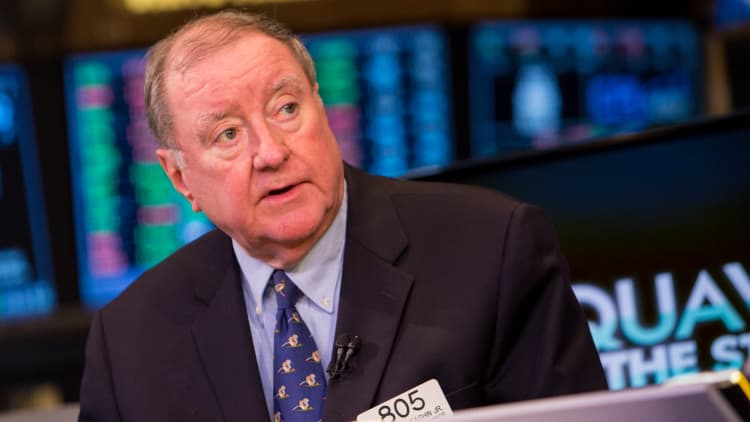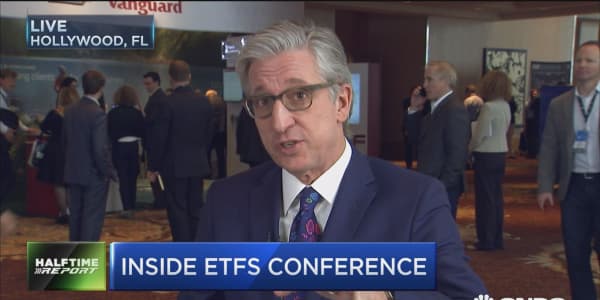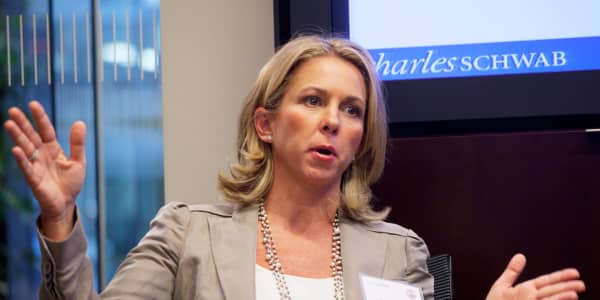Of all the things that could be rattling the volatile stock market Tuesday, one anomaly especially caught the attention of some investors.
Doubleline Capital founder Jeff Gundlach, more known for his bond prowess than as an equity market expert, pointed out that the has never had seven consecutive up years.
Of course, records are made to be broken, and each year is supposed to stand on its own.
But in a market that faces an uncertain future regarding monetary policy, the specter of a global economic slowdown, and an oil price plunge that is dampening capital investment, Gundlach's little factoid sparked a lot of chatter at ETF.com's InsideETFs conference in Hollywood, Florida.
"You have never seen seven up years in a row, and you would be breaking that record if you went up this year," he said during a morning presentation in which he issued a number of cautionary tones about the state of the economy and financial markets.

Those remarks came as U.S. stocks took a sharp slide in a morning filled with disappointing earnings reports and weak economic data.
Read MoreCashin connects dots on strong dollar stock drop
No one is likely to build a strategy based on how many years in a row the market is up, but the trend did lead to some pause among market experts.
"I don't think I'd make a forecast of a year based solely on that, but it's something to bear in mind because if you go up six years in a row you're probably at fairly rich valuations. You get a lot of people more bullish than they should be," David Blitzer, managing director and chairman of the index committee for S&P Dow Jones Indices, told CNBC.com.
"I wouldn't hang your hat on that as the only factor, but if you see a lot of uncertainty, a lot of nervousness, a couple trouble spots, high valuation—then the seventh year of increasing prices, I wonder if we can do that," he added.
Unlike a lot of his peers, Blitzer thinks the S&P 500 is highly priced at more than 17 times earnings. He thinks a correction is likely, though not necessarily "needed" per se.
Read MoreCramer:Markets will be 'stupid'
"If you're going to get (market gains) not just seven years but eight years in a row, either you're going to have to grow earnings very fast or have prices drop down," he said. "I'm reluctant to say we need a correction. I used to do economic forecasting. You could forecast a recession, but you could never say we need a recession."
Christian Menegatti, chief investment strategist at Windhaven Investment Management, said he heard Gundlach's words about seven years of S&P 500 growth and agreed that it's a trend investors need to keep in mind.
Menegatti, who served as head of research for 10 years with "Dr. Doom" Nouriel Roubini's Roubini Global Economics, said that like his former boss he sees the U.S. in better shape than most of the world, a condition that likely will help equity prices.
Read MoreGundlach: Fed should hold line, ECB QE will fail
However, he pointed out that the changing dynamics of global monetary policy—the Federal Reserve on the cusp of a tightening cycle while its counterparts like the European Central Bank are easing—are creating a bumpy market environment.
"We are looking at a period of time in which volatility on average will be a little higher and come a little more frequently," Menegatti said. "These divergences that we're seeing in terms of central bank policy ... will continue to constitute somewhat uncharted territory for investors (and) leave them much more susceptible to any kind of shock."





